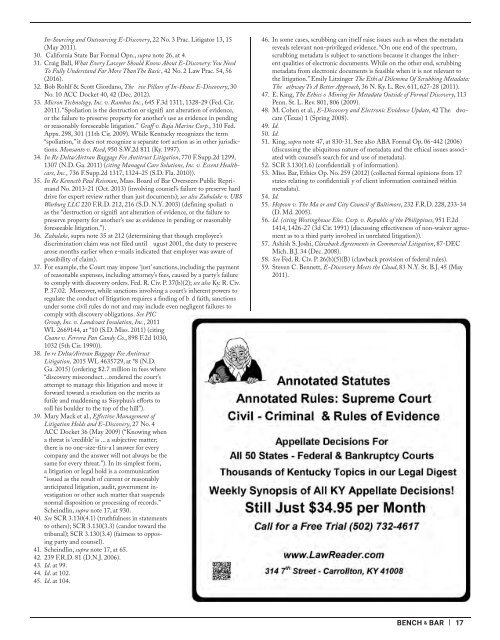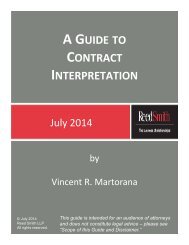you AND your spouse
BB_0716
BB_0716
You also want an ePaper? Increase the reach of your titles
YUMPU automatically turns print PDFs into web optimized ePapers that Google loves.
In-Sourcing and Outsourcing E-Discovery, 22 No. 3 Prac. Litigator 13, 15<br />
(May 2011).<br />
30. California State Bar Formal Opn., supra note 26, at 4.<br />
31. Craig Ball, What Every Lawyer Should Know About E-Discovery: You Need<br />
To Fully Understand Far More ThanThe Basic, 42 No. 2 Law Prac. 54, 56<br />
(2016).<br />
32. Bob Rohlf & Scott Giordano, The ive Pillars of In-House E-Discovery, 30<br />
No. 10 ACC Docket 40, 42 (Dec. 2012).<br />
33. Micron Technology, Inc. v. Rambus Inc., 645 F.3d 1311, 1328-29 (Fed. Cir.<br />
2011). “Spoliation is the destruction or signifi ant alteration of evidence,<br />
or the failure to preserve property for another’s use as evidence in pending<br />
or reasonably foreseeable litigation.” Graff v. Baja Marine Corp., 310 Fed.<br />
Appx. 298, 301 (11th Cir. 2009). While Kentucky recognizes the term<br />
“spoliation,” it does not recognize a separate tort action as in other jurisdictions.<br />
Monsanto v. Reed, 950 S.W.2d 811 (Ky. 1997).<br />
34. In Re Delta/Airtran Baggage Fee Antitrust Litigation, 770 F.Supp.2d 1299,<br />
1307 (N.D. Ga. 2011) (citing Managed Care Solutions, Inc. v. Essent Healthcare,<br />
Inc., 736 F.Supp.2d 1317, 1324–25 (S.D. Fla. 2010)).<br />
35. In Re Kenneth Paul Reisman, Mass. Board of Bar Overseers Public Reprimand<br />
No. 2013-21 (Oct. 2013) (involving counsel’s failure to preserve hard<br />
drive for expert review rather than just documents); see also Zubulake v. UBS<br />
Warburg LLC 220 F.R.D. 212, 216 (S.D. N.Y. 2003) (defining spoliati n<br />
as the “destruction or signifi ant alteration of evidence, or the failure to<br />
preserve property for another’s use as evidence in pending or reasonably<br />
foreseeable litigation.”).<br />
36. Zubulake, supra note 35 at 212 (determining that though employee’s<br />
discrimination claim was not filed until ugust 2001, the duty to preserve<br />
arose months earlier when e-mails indicated that employer was aware of<br />
possibility of claim).<br />
37. For example, the Court may impose ‘just’ sanctions, including the payment<br />
of reasonable expenses, including attorney’s fees, caused by a party’s failure<br />
to comply with discovery orders. Fed. R. Civ. P. 37(b)(2); see also Ky. R. Civ.<br />
P. 37.02. Moreover, while sanctions involving a court’s inherent powers to<br />
regulate the conduct of litigation requires a finding of b d faith, sanctions<br />
under some civil rules do not and may include even negligent failures to<br />
comply with discovery obligations. See PIC<br />
Group, Inc. v. Landcoast Insulation, Inc., 2011<br />
WL 2669144, at *10 (S.D. Miss. 2011) (citing<br />
Coane v. Ferrera Pan Candy Co., 898 F.2d 1030,<br />
1032 (5th Cir. 1990)).<br />
38. In re Delta/Airtran Baggage Fee Antitrust<br />
Litigation, 2015 WL 4635729, at *8 (N.D.<br />
Ga. 2015) (ordering $2.7 million in fees where<br />
“discovery misconduct…rendered the court’s<br />
attempt to manage this litigation and move it<br />
forward toward a resolution on the merits as<br />
futile and maddening as Sisyphus’s efforts to<br />
roll his boulder to the top of the hill”).<br />
39. Mary Mack et al., Effective Management of<br />
Litigation Holds and E-Discovery, 27 No. 4<br />
ACC Docket 36 (May 2009) (“Knowing when<br />
a threat is ‘credible’ is ... a subjective matter;<br />
there is no one-size-fits-a l answer for every<br />
company and the answer will not always be the<br />
same for every threat.”). In its simplest form,<br />
a litigation or legal hold is a communication<br />
“issued as the result of current or reasonably<br />
anticipated litigation, audit, government investigation<br />
or other such matter that suspends<br />
normal disposition or processing of records.”<br />
Scheindlin, supra note 17, at 930.<br />
40. See SCR 3.130(4.1) (truthfulness in statements<br />
to others); SCR 3.130(3.3) (candor toward the<br />
tribunal); SCR 3.130(3.4) (fairness to opposing<br />
party and counsel).<br />
41. Scheindlin, supra note 17, at 65.<br />
42. 239 F.R.D. 81 (D.N.J. 2006).<br />
43. Id. at 99.<br />
44. Id. at 102.<br />
45. Id. at 104.<br />
46. In some cases, scrubbing can itself raise issues such as when the metadata<br />
reveals relevant non-privileged evidence. “On one end of the spectrum,<br />
scrubbing metadata is subject to sanctions because it changes the inherent<br />
qualities of electronic documents. While on the other end, scrubbing<br />
metadata from electronic documents is feasible when it is not relevant to<br />
the litigation.” Emily Litzinger The Ethi al Dilemma Of Scrubbing Metadata:<br />
The athway To A Better Approach, 36 N. Ky. L. Rev. 611, 627-28 (2011).<br />
47. E. King, The Ethics o Mining for Metadata Outside of Formal Discovery, 113<br />
Penn. St. L. Rev. 801, 806 (2009).<br />
48. M. Cohen et al., E-Discovery and Electronic Evidence Update, 42 The dvocate<br />
(Texas) 1 (Spring 2008).<br />
49. Id.<br />
50. Id.<br />
51. King, supra note 47, at 830-31. See also ABA Formal Op. 06-442 (2006)<br />
(discussing the ubiquitous nature of metadata and the ethical issues associated<br />
with counsel’s search for and use of metadata).<br />
52. SCR 3.130(1.6) (confidentiali y of information).<br />
53. Miss. Bar, Ethics Op. No. 259 (2012) (collected formal opinions from 17<br />
states relating to confidentiali y of client information contained within<br />
metadata).<br />
54. Id.<br />
55. Hopson v. The Ma or and City Council of Baltimore, 232 F.R.D. 228, 233-34<br />
(D. Md. 2005).<br />
56. Id. (citing Westinghouse Elec. Corp. v. Republic of the Philippines, 951 F.2d<br />
1414, 1426-27 (3d Cir. 1991) (discussing effectiveness of non-waiver agreement<br />
as to a third party involved in unrelated litigation)).<br />
57. Ashish S. Joshi, Clawback Agreements in Commercial Litigation, 87-DEC<br />
Mich. B.J. 34 (Dec. 2008).<br />
58. See Fed. R. Civ. P. 26(b)(5)(B) (clawback provision of federal rules).<br />
59. Steven C. Bennett, E-Discovery Meets the Cloud, 83 N.Y. St. B.J. 45 (May<br />
2011).<br />
BENCH & BAR |<br />
17



